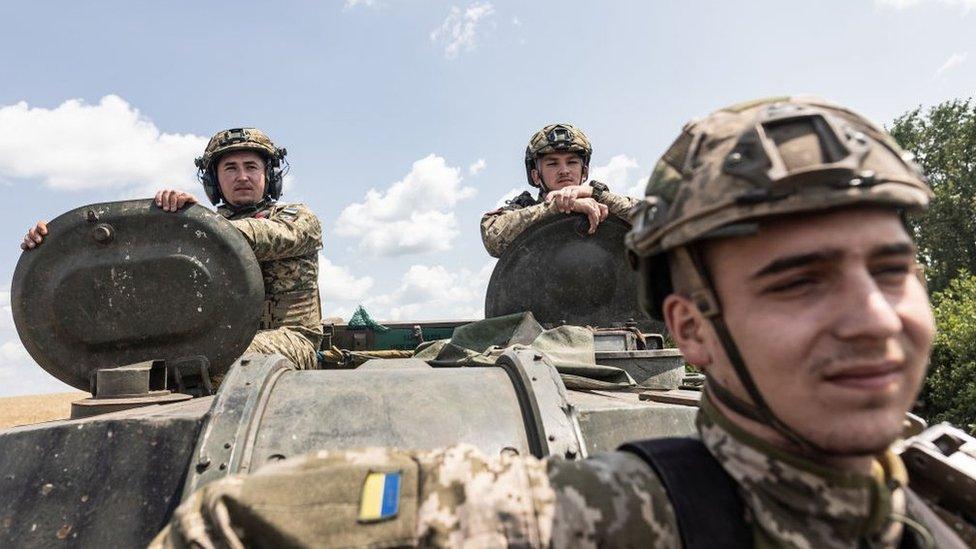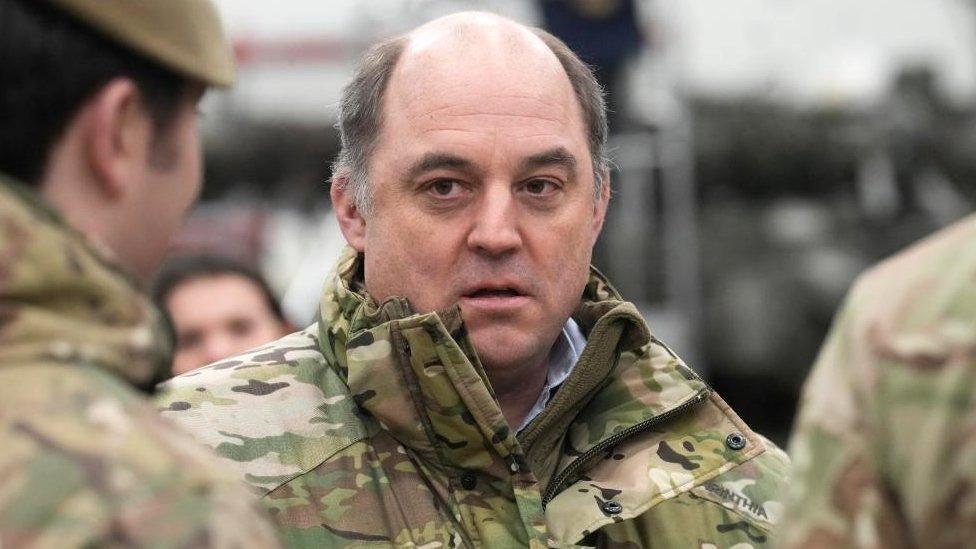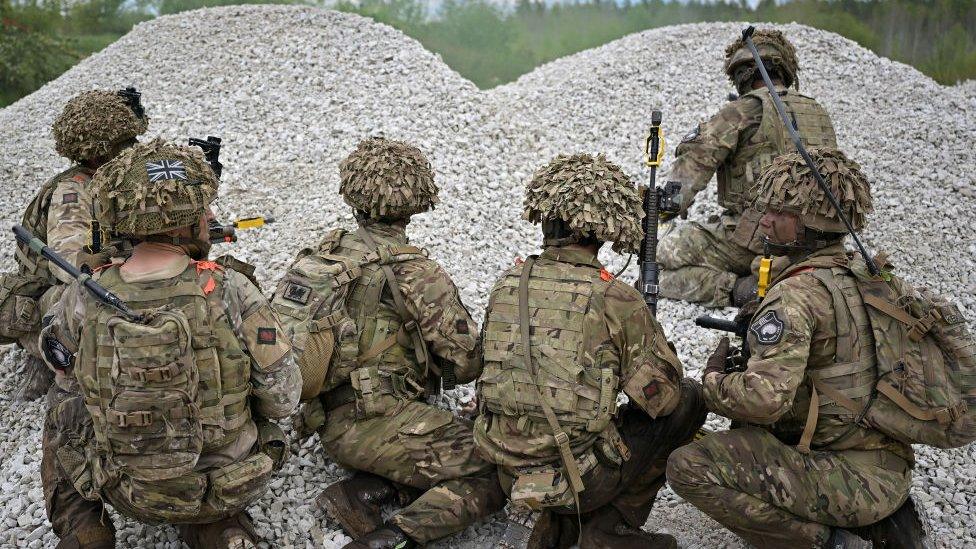Ben Wallace: Ukraine has 'tragically become a battle lab' for war technology
- Published
- comments

Defence Secretary Ben Wallace said it would be "foolish" to ignore the war strategies being played out in Ukraine
Ukraine has "tragically become a battle lab", but lessons learned will inform the future of Britain's armed forces, Defence Secretary Ben Wallace has said.
He was speaking ahead of the release of a revised Defence Command Paper, first published before the war began.
Mr Wallace said that the effectiveness of weapons given to Kyiv by its allies had heavily influenced the revisions.
"We would be very foolish to ignore these lessons and not import them into our own armed forces," he said.
The updated paper - originally published in 2021, external - sets out how the UK will invest an additional £2.5bn of defence spending. Mr Wallace said the government did not plan on issuing a new version so soon, but the world has shifted and become more volatile.
Mr Wallace, who plans to step down as defence secretary at the next cabinet reshuffle after four years in the job, said: "The war in Ukraine has focused minds because there is a very real adversary being very aggressive, breaking all the rules of war on the continent of Europe, fighting a war designed to destroy a country.
"That makes us realise we had better change the risk appetite we had when we did this paper originally.
"Originally we were taking things out of service, having a bit of a gap in the middle of the decade, and then we'd have the new equipment. That's something I don't want to risk any more."
The experience of Ukraine's armed forces, and the way in which allies have been able to assist - including quick adaptations of existing equipment to suit Kyiv's needs - is a thread running through much of Tuesday's paper, external.
It says one of the lessons learnt from the war is that the pace of innovation is getting faster - and cannot be met by the traditional, often decades-long programmes to get equipment. Instead, equipment should be designed with the possibility of making quick upgrades, the paper says.
It also highlights the need to harness the latest technology - including AI and quantum computing - to make Britain's armed forces more agile and adaptive.
"New technologies are not gimmicks, they're fundamentally key to how we fight a modern war," Mr Wallace said.
He added that analysing the strategies playing out in Ukraine would help "make sure that we can be match fit for any future conflict".
The document also sets out plans for more personnel to have a "zigzag" career path - which could include leaving the military to gain experience elsewhere and then re-joining.
Young people "envisage careers that are flexible and see themselves working in a number of different professions, rather than progressing within a single organisation", the document says - and so the government will embrace "greater opportunity for career mobility between jobs in defence and whatever other employment they'd like to pursue elsewhere".
And it says £400m will be spent on modernising accommodation for service families. This money was already in the defence budget but has been reallocated.
The refresh is not about cuts to the size of the army - this was already announced in a review in 2021, with a plan to cut the Army to 72,500 soldiers by 2025.
Drone defence and artillery
Another such lesson from the war in Ukraine is the "power of electronic warfare", Mr Wallace said, explaining: "The use of [electronic] warfare either to act as a decoy or to act as a defence is becoming really important, so it goes up the priority list."
He said that the war in Ukraine had also concentrated minds on the use of "deep fire" artillery, and had informed the decision to retire old 155mm guns and bring in new replacements.
"We have seen a generational shift in ranges of 'deep fire' artillery," he said. "The 155mm gun roughly had a 22-25km range for about 50 years.
"The new generation ... you're getting ranges of 60km in future. So I have taken a decision to phase out the old 155mm [for] the Swedish Archer 1."
Artillery has played a significant role for both sides in Ukraine. Britain's armed forces, however, have scaled down their artillery forces since the end of the Cold War.
Mr Wallace said: "At the end of the Second World War, 35% of the army was artillery. Now, it's roughly 8%. Deep fire is something we need to rebalance. These are the lessons."
Labour said the plan was "driven by costs, not by threats", and also questioned whether it would stand the test of time, with Mr Wallace due to step down.
"As his own future is now short, how long is the shelf life of his plan?" asked shadow defence secretary John Healey.
"Industry and military leaders cannot be sure his successor will agree with his decisions, will accept his cuts, will act on his approach."
Speaking in the Commons after Mr Wallace set out his plan, Mr Healey also criticised the time it has taken to update the paper, saying: "Why has this plan been so delayed? It's 510 days since Putin shattered European security."
'£24bn legacy'
Former soldier Mr Wallace played a key role in the UK's response to the Russian invasion of Ukraine.
His Wyre and Preston North constituency in Lancashire will disappear at the next general election because of boundary changes and he has said he will not seek a new seat.
Speaking about the mark he hoped to leave on the MoD, Mr Wallace told the BBC that Prime Minister Rishi Sunak had given his department a "massive £24bn legacy".
"I've come in, and we've had a real term rise in our defence spending," he said.
He also warned that the conflict in Ukraine served as a reminder that "there are bad people out there wanting to do bad things to Britain and her allies".
Related topics
- Published22 June 2023

- Published13 March 2023

- Published28 July 2022
